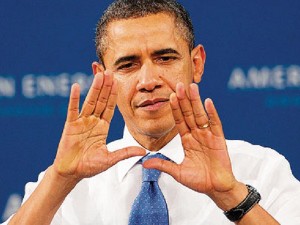Obama to showcase US clout
WASHINGTON—President Barack Obama hopes to demonstrate rising US clout in Asia on his first foreign trip since his reelection, with a tour of three countries, including a once unthinkable stop in changing Burma (Myanmar).
Obama, who has cast himself as the first “Pacific president” with his roots in Hawaii and boyhood years in Indonesia, will head on Saturday to longtime US ally Thailand and meet Asia’s top leaders at a summit in Cambodia.
Outgoing Chinese Premier Wen Jiabao is also taking part in the summit organized by the Association of Southeast Asian Nations (Asean), a 10-member bloc China holds talks with.
Tensions have flared over territorial disputes in the region, including rival claims by China, the Philippines and Vietnam to South China Sea islands. Some of the isles lie in what Manila calls the West Philippine Sea.
It will be the first trip by a US president spent entirely in Southeast Asia since the Vietnam War, part of Obama’s effort to focus on the largely US-friendly region where several nations worry about a rising China.
Pivot to Asia
Obama has launched a so-called “pivot” to Asia, which included greater military cooperation with Australia, Thailand and Vietnam and a plan to shift the bulk of the US Navy to the Pacific by 2020.
“Continuing to fill in our pivot to Asia will be a critical part of the president’s second term and ultimately his foreign policy legacy,” Ben Rhodes, a deputy national security adviser, told reporters.
Tom Donilon, the national security adviser, said Obama’s trip showed the United States was “not only rebalancing towards Asia; we’re also rebalancing our efforts within Asia.”
Donilon said it was “impossible to overstate Asia’s importance” to the United States as the continent is expected to account for nearly half of the world’s economic growth outside the United States through 2017.
“The fact is today that there is a tremendous demand and expectation of US leadership in the region,” Donilon said.
Main challenge
Virtually no nation has seen a greater shift toward the United States under Obama than Burma, for years a close ally of China and treated as a pariah by Western nations.
Surprising skeptics, Burma launched reforms after a nominal end to nearly half a century of army rule last year. President Thein Sein, a former general, released political prisoners, opened dialogue with ethnic rebels and allowed opposition icon Aung San Suu Kyi to enter parliament.
Obama’s main challenge will be to lend encouragement to a fragile democratic transition while prodding the quasi-civilian government to do more to improve human rights and curb sectarian bloodshed.
Some human rights groups said Obama should have waited, arguing that he could have dangled the prospect of a visit as leverage to seek more progress, such as the release of remaining political prisoners numbering in the hundreds.
‘China is the breeze now’
Danny Russel, Obama’s top aide on Asia, countered: “This is not a victory celebration, this is a barn raising.”
“We want to show the people of Burma that there are benefits to be had from the hard work and move some of the leaders off the fence and into the reform program,” he said.
Thailand is the oldest US ally in Asia, famously offering elephants to Abraham Lincoln in the Civil War. But the kingdom has been consumed by internal disputes.
Michael Green, who held Russel’s position under former President George W. Bush, said Thailand had historically kept a balance between major powers. “Thailand has always sort of gone with the breeze. And China’s very much the breeze now,” he said.
Troubled children
The three nations Obama will visit are “sort of the three troubled children of ‘the pivot.’ Each has a complicated relationship with the US and with China,” Green said.
While few expect Thailand to shift wholescale to Beijing, Cambodia has been China’s staunchest supporter in the Asean.
Obama will be the first sitting US president to visit Cambodia. Samantha Power, his adviser on human rights, said Obama was concerned about Cambodia’s “very worrying” direction on human rights.
On the summit sidelines, Obama will meet China’s Wen and Prime Minister Yoshihiko Noda of Japan, whose relations with Beijing have grown tense due to territorial claims.
Japan is one of five treaty-bound US allies in the region. In a veiled reference to China, Donilon said Washington’s alliances were a key asset.
Watching Xi
When “you think about our competitors and possible competitors around the world, you come to the conclusion that no other nation in the world has the set of global alliances that the United States has,” he said.
Obama’s efforts to persuade Asian partners of his commitment to the region could be undercut by instability in the Middle East, lingering tensions with China at a time when a new leadership is taking over and big distractions at home, including a looming fiscal crisis.
Another complication is China’s once-in-a-generation changing of the guard. He goes to the region just after China’s president-in-waiting, Xi Jinping, was appointed head of the ruling Communist Party.
Washington is watching for signs of how Xi and his leadership team will guide the world’s second largest economy and especially whether there will be any change in Beijing’s handling of trade and currency practices that have drawn US criticism.
US officials are also mindful that Asian leaders may be hesitant to fully embrace Washington’s efforts to reinforce its influence until questions about China are cleared up.
Donilon insisted Washington would be undeterred from projecting US military power in the region. He said Obama was determined to keep his pledge that “reductions in US defense spending will not come at the expense of the Asia-Pacific.”
